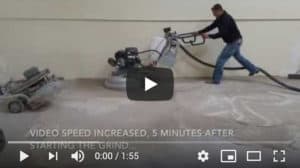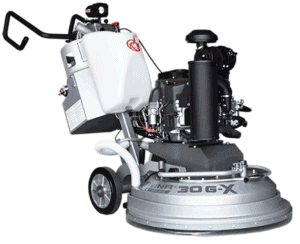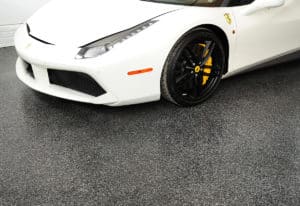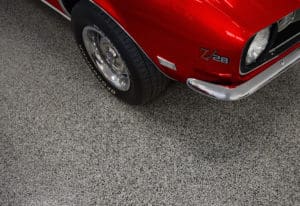If you’re a professional contractor (or have hired one) that specializes in the installation of epoxy, polyurethane, and polyurea-polyaspartic floor coatings, then you know the importance of concrete preparation. This step is critical to installing high quality floor coatings. Why?
Concrete Preparation – Surface Profiles
Well, it’s all about concrete surface profile (CSP). For coating products to properly “bond”, the concrete needs to be textured. That is, it needs to be rough. Smooth concrete just doesn’t provide a receptive substrate. According to the International Concrete Repair Institute, the roughness of concrete surfaces can be ranked. A smooth surface will have a CSP of 1, while the roughest surfaces, a CSP of 10.
Take a peek at the following link for concrete surface profile photographs:
http://www.tccmaterials.com/userfiles/file/ConcreteSurfaceProfiles.pdf
Methods of Concrete Preparation
There are many methods that can be used to prepare concrete, from low-pressure water jetting and acid etching to aggressive sand blasting and rotomilling. Low pressure water jetting and acid etching produce too low a CSP (2 and lower) and are simply not good enough for long-term bonding of your newly applied coating. Why? Because this may lead to peeling, especially in high-traffic areas like garage floors.
Conversely, sand blasting and rotomilling produce high CSPs (greater than 4) which are generally unnecessary for the purpose of epoxy, polyurethane, polyurea-polyaspartic applications.
Enter Stage Left: Diamond Grinders
Diamond grinders can produce CSPs of 3 or more, up to 4 in some cases. When prepping concrete for epoxy, polyurethane, polyurea-polyaspartic applications, this CSP is in the Goldilocks range. But it is important to note that the type of grinder used is as important as the method of concrete preparation.
Electric vs Propane Diamond Grinders
Although electric grinders are a lot cheaper to buy than propane grinders, they are less powerful and may produce a lower CSP. Equally important, electric grinders take much longer to grind an equivalent space than their propane counterpart. Take a look at our “Grind-Off” video to see the obvious difference:

Use a Propane Grinder
Propane grinders are safe and are especially important for use in commercial flooring environments. Don’t try to grind large commercial spaces with an electric grinder! Trust me, you’ll regret it. Propane grinders do not require electricity and thereby move freely through the work space without the worries of electrical extension cords, especially in spaces that tend to be wet or damp.
For those that worry about the flammability of propane, know that it has a very narrow and very high temperature range of flammability (unlike the gasoline in your car!). Because a propane grinder produces a near zero exhaust emission, it may even be used indoors. So why wouldn’t every contractor use a propane grinder? Because they’re expensive…up to $17,000 and more.
Ensure your flooring contractor is using an appropriate grinder to properly prepare the concrete. Any other method that produces CSPs outside the “Goldilocks range” may bring unneeded headaches in the form of peeling and repairs.

Three Rules for Long-Lasting Coatings
Just remember these three rules for installing a long-lasting epoxy, polyurethane, polyurea-polyaspartic floor coating:
- Properly prepare the concrete substrate to create a proper profile (CSP) – grind it!
- Use a professional propane grinder
- Use an experienced floor coatings contractor
The Wrap
Thinking of having a floor coating installed inside or outside your home. Talk to an authorized GarageFloorCoating.com flooring specialist about your needs. You can find an authorized dealer or franchise near you by going to www.garagefloorcoating.com.



About the Author

Share this Post


